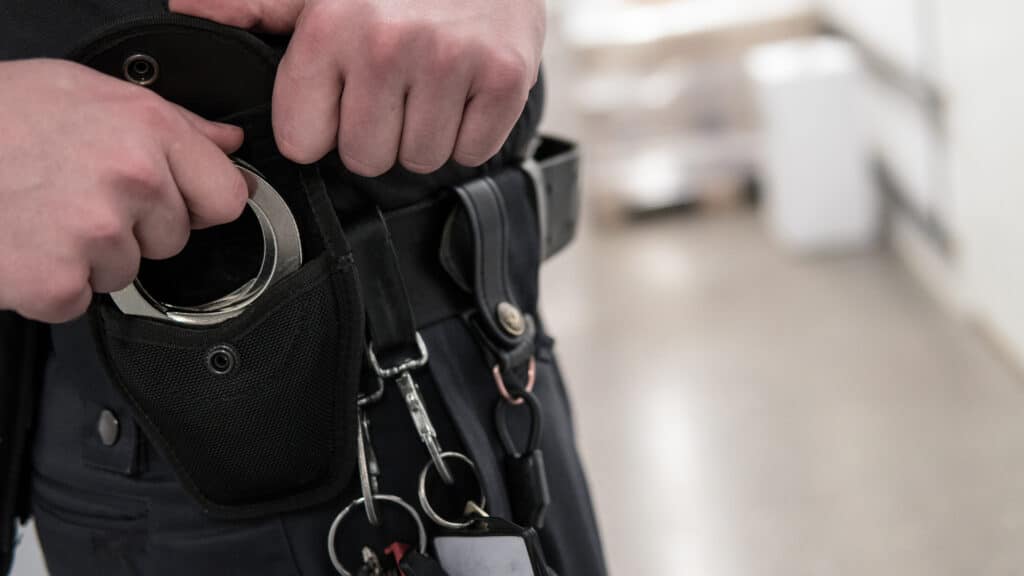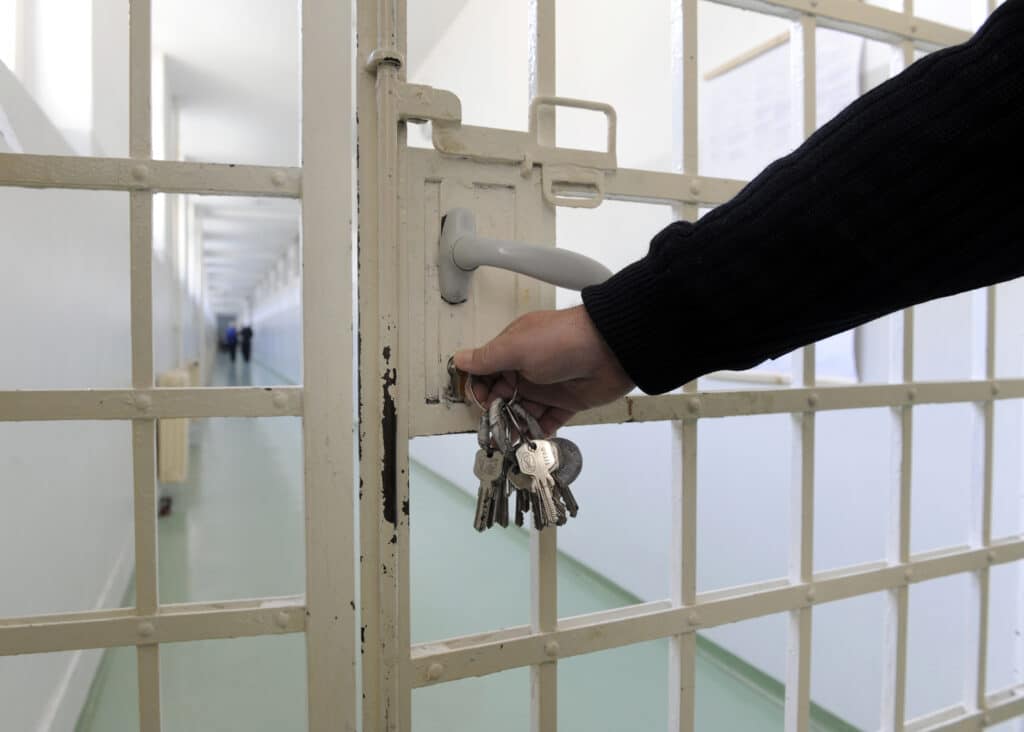Inmates come into contact with various federal prison staff through job assignments, educational classes, leisure activities, and other daily events. This page explains the roles of each type of correctional officer. Learn about wardens, associate wardens, prison guards, federal corrections officers, and others here.
Contact the Zoukis Consulting Group if you are preparing to surrender to federal prison or have a loved one in the Federal Bureau of Prisons. Our team can help you prepare, resolve any in-prison matters, and help you reenter society successfully.
Book a one-hour initial consultation today!
Table of contents

Federal Prison Staff
It helps to understand prison staff roles and how the administration is structured. This hierarchy of prison staff illustrates the structure and operations of individual federal prisons. The following descriptions are presented from the top down.
Wardens
Wardens are the chief executive officer in all federal prisons. They report to their respective Regional Directors, who report to the Federal Bureau of Prisons’ Director.
Prison wardens generally remain at particular institutions for only a few years. In recent years, the federal prison system has added the post of Complex Warden to oversee the growing number of multi-security-level complexes such as Federal Correctional Complexes. These FCCs often encompass medium-, low-, and camp-level federal prisons.
Wardens may supervise as many as 5,000 inmates and hundreds of employees. Correctional officers typically work their way through the ranks before becoming a warden.
Federal prison wardens wield broad discretion and authority, ranging from authorizing lethal force to the items sold in the prison commissary. They are the final arbiters of all matters resolvable at the institutional level.
Most inmates never interact with wardens or others on the executive staff. For those that need to, most Wardens follow the Federal Bureau of Prisons’ tradition of “standing mainline” during the noon meal. The heads of the various departments make themselves available in or directly outside the chow hall to be directly approached.
As in any organization, management styles vary. Some answer emails from inmates directly. Others talk to inmates in the recreation yard. Some are rarely seen. Most prison wardens direct inmate concerns to lower-level staff members.
Associate Wardens (AWs)
Directly below the wardens are the associate wardens. These are also called assistant wardens. Often, numerous associate wardens work at each federal prison.
Each associate warden supervises a specific operational area. For example, an assistant warden supervises UNICOR operations. Likewise, another associate warden oversees all inmate housing unit operations. Associate wardens are typically available at mainline several times a week.
Some federal prison facilities also have an administrative assistant to the warden. These prison staff members are generally more accessible than wardens and associate wardens.
Corrections Captains
The Corrections captain supervises all correctional officers at federal prison system facilities. The captain is responsible for inmate and staff safety and security.
Captains are usually equivalent to associate wardens in terms of authority. As such, their directives and decisions receive equal weight.
Wardens often defer to captains on correctional questions because captains are considered experts in safety and security matters. Generally, inmates have few reasons to interact with their prison’s corrections captain.
Correctional Lieutenants
Correctional lieutenants report directly to the captain. They handle day-to-day decision-making.
Numerous lieutenants work in each facility, including an Operations Lieutenant and an Activities Lieutenant. They also work in the Special Investigative Supervisor (SIS) Department and the Assignment Office, handling staffing issues.
Lieutenants are usually the boots-on-the-ground decision-makers. They initiate emergency procedures, lockdowns, or use of force. Correctional lieutenants can overrule the non-correctional staff in most matters requiring an immediate decision. At least one lieutenant is present whenever an inmate leaves for a trip to a hospital or a prison transfer.
Lieutenants handle much of the investigation and initial processing of prison disciplinary matters. Their decisions include whether to lock up an inmate in the Special Housing Unit pending further investigation.
Lieutenants are usually extremely busy because they address a wide variety of matters. Inmates should avoid unnecessary drama when interacting with them. Correctional lieutenants are empowered to confine inmates to the Special Housing Unit and may choose to do so rather than engage in unpleasant interactions.
Much like other prison supervisory positions, most lieutenants start out as front-line federal corrections officers.

Correctional Officers
Federal prison frontline troops are correctional officers. These are also known as prison guards and corrections officers.
These entry-level employees are traditionally referred to as “COs” in the Federal Bureau of Prisons. While inmates often refer to them as prison guards, guards, and less respectful labels, they prefer to be called COs or correctional officers.
Corrections officers in some facilities contend with enormous stress and danger in their roles as keepers of the keys. At the high-security United States Penitentiary level, many guards wear stab vests under their uniforms for protection from inmate assaults.
Prison guards ensure order and perform the perpetual locking and unlocking of cells and doors. They also conduct inmate counts and search inmates for contraband. These searches are conducted in inmate cells and at other locations.
Correction officers also write reports and issue disciplinary citations. Their role can vary from supervising inmate work crews to staffing guard towers. They are authorized to fire lethal weapons at inmates. Prison guards represent the most significant number of Bureau staff within prison facilities.
The federal prison system requires a periodic rotation of duties for many corrections officer posts. Nevertheless, many inmates develop relationships with federal prison guards, which can be good, bad, or indifferent.
Prisons are like small towns. How well inmates get along with frontline correctional officers sometimes impacts their quality of life. Most experienced convicts take the position that it never hurts to be polite to prison guards. They often reciprocate in kind.
It is wise to be polite, but it is not intelligent to regularly associate with corrections officers. A simple “thank you” is a good idea but a long conversation behind closed doors – and even with the door open – leads fellow prisoners to assume that the inmate is an informant.
Unit Teams
The Unit Team manages each inmate housing unit. The Unit Team consists of four staff members:
- Unit Manager
- Case Manager
- Correctional Counselor
- Unit Secretary
- Unit Officer
Inmates can expect to meet with their unit team every six months. These are referred to as Unit Team Reviews. At these meetings, case managers discuss the inmate’s Custody and Classification points, which determine their prison security level. The correctional counselor discusses cell sanitation, any educational or rehabilitation programs they want the inmate to engage in, and so forth.
Unit Managers
Unit managers are responsible for each prisoner’s classification status, housing, and other matters. They also oversee correctional counselors, case managers, and unit secretaries. A unit manager might be responsible for as many as four housing units that hold 500 or more inmates.
Unit managers chair the Unit Disciplinary Committee (UDC) hearings, Unit Team classification meetings, and other committees. They also have authority over Inmate Financial Responsibility Program (IFRP) matters.
Beyond their supervisory duties, unit managers act as intermediate arbiters of formal and informal inmate complaints. This review typically occurs before complaints reach wardens and other executive staff.
Correctional Counselors
Correctional counselors interact with inmates daily. They wear a correctional officer’s uniform and perform some traditional prison guard functions.
Corrections counselors are responsible, among other duties, for:
- Assigning inmates to bunks and facilitating these changes
- Inmate housing unit orientation
- Unit Team classification
- Unit Disciplinary Committee
- Supervising, hiring, and paying inmate workers
- Facilitating inmate self-help groups such as AA, NA, Anger Management, etc.
- Distribution of cell sanitation supplies and unit resources
- Supervising inmates’ special mail, legal visits, and telephone calls
- Processing inmate requests via other departments
- Establishing and enforcing inmate housing unit rules and regulations
An inmate’s relationship with their correctional counselor can significantly impact their life during incarceration. Correctional counselors determine the following:
- Cell and dormitory assignments
- Inmate work assignments
- How quickly a visitor clearance form is approved
- Even how much toilet paper inmates are issued
Correctional Case Managers
Prison case managers are primarily responsible for computing inmate custody levels and classification scoring.
While national policy governs security scoring matters, case managers exercise considerable judgment. Much of the classification process is subjective, and a correctional case manager’s opinion can significantly influence an inmate’s custody and classification scoring.
For example, categories such as “responsibility” and “family ties” are only marginally guided by policy. Prison case managers can add or subtract several points toward an inmate’s custody and classification score. As such, their judgment can have significant sway.
Case managers generally direct custody and classification proceedings and might serve on Unit Disciplinary Committee (UDC) hearings. They do not wear uniforms.
While some inmates seem to manufacture reasons to speak to unit team staff, most inmates find that these interactions are limited to the required periodic Unit Team meetings.
Unit Secretary
Every inmate housing unit has a Unit Secretary who handles administrative matters for the unit management team.
Secretaries often distribute legal and certified mail to inmates, among other administrative tasks. This is often an entry-level position for people seeking higher posts within the Federal Bureau of Prisons.
Prison Medical Staff
Federal Bureau of Prisons medical staff is organized as a Health Service Unit in all general-population institutions.
Clinical directors and health service administrators oversee Health Service Units. The clinical director is usually a physician who is an outside contractor. The health service administrator is the chief administrator for most institutions’ Health Services Units. Both prison healthcare staff members report directly to the warden. Many prison medical employees are contracted from the U.S. Public Health Service.
Inmates address their medical needs by interacting with the following prison staff members:
- Nurses
- Emergency Medical Technicians
- Physician’s Assistants
- Mid-Level Practitioners
Mid-level practitioners are a concept primarily seen in federal prison health care. These are typically graduate physician assistants working under a licensed physician.
These staff members handle routine care, sick-call appointments, and initial consultations. Assigned mid-level practitioners act as gatekeepers and an inmate’s primary point of contact with the medical department. They evaluate condition’s seriousness and direct medical care.
Registered nurses and licensed physicians are consulted when inmates require more specialized care. Local contract professionals sometimes provide more specialized care, including:
- Psychiatrists
- Orthopedic Surgeons
- Dermatologists
- Optometrists
Most Health Service Units also employ additional medical staff such as pharmacists, lab technicians, and medical records technicians. Correctional officers are often assigned to medical areas.
Federal Bureau of Prisons’ medical staff is usually overworked. Additionally, their power to resolve many cases is circumscribed by regulations limiting their discretion.
Inmates should maintain a patient attitude when dealing with prison healthcare staff. If not, they risk long delays for care and appointments. Likewise, prison healthcare staff, much like federal corrections officers, can issue incident reports for inmate misconduct.

Prison Dentists
The U.S. Public Health Service’s Commissioned Corps provides most federal prison dentists. As such, dentists typically wear this uniform.
Each institution must have at least one dentist, a dental assistant, and one dental hygienist on staff. An inmate dental technician program trains qualified inmates for work in a dental office at some facilities.
Federal prison dental technicians provide routine care and maintenance services (i.e., cleanings, check-ups, etc.). They also perform traditional dental procedures (e.g., fillings, extractions, etc.). More advanced procedures, such as those requiring oral surgery, are performed by professionals off-site.
While not always the case, federal corrections officers are sometimes assigned to the dental department to monitor inmates.
Prison Psychologists
Most Federal Bureau of Prisons facilities have several staff psychologists. These correctional psychologists perform new inmate initial evaluations, provide referrals for drug treatment programs, and counsel inmates.
The Psychology Department also manages sex offender management and treatment programs. Although psychologists do not prescribe or dispense medications, they provide referrals to the medical department when psychotropic medications are necessary.
All federal prison system psychologists must report evidence of an inmate “presenting a serious danger of violence” to himself or others. Within the unique setting of a federal prison, this mandate dictates the kind of interactions psychology staff have with inmates.
Drug treatment specialists conduct substance-abuse treatment programs within the psychology department. These treatment programs include the Non-Residential Drug Abuse Program and Drug Education Class. These prison psychologists are not doctors but college graduates. The psychology secretary is also within the department and holds an entry-level position.
At some correctional facilities, such as Sex Offender Management Program facilities, prison psychologists take on a role more akin to federal corrections officers. In this light, instead of focusing on inmate mental health, they monitor inmates and issue incident reports for inmate misconduct.
Prison Chaplains
Every Federal Bureau of Prisons facility has at least one prison chaplain. There are several chaplains and other religious visitors from various religious groups in some instances.
Prison chaplains oversee the religious services of the institution, scheduling and operating worship services for various religious groups. Many facilities also offer religious video viewing and other study opportunities.
Chaplains also provide death notifications and grief counseling for inmates who lose loved ones. They also provide inmates with information regarding family member hospitalizations.
Inmates should advise family members to telephone the prison and ask specifically for the chaplaincy staff if they wish to notify about emergencies (i.e., death or severe illness). While family members will be met by a regular federal prison guard, they can request a transfer to the chapel.
Moreover, family members should be steadfast about receiving a return call from the inmate when making these calls. If they don’t receive a call within twenty-four hours, they should call again and repeat the request. Unfortunately, federal prison staff is notorious for neglecting to pass on urgent messages like these.
Prison Teachers
The Supervisor of Education heads the Education Department. These departments ideally employ several full-time teachers who provide teaching and training to inmates.
Many of these prison teachers are dedicated to helping inmates, but some are uninspired. They might merely supervise inmate tutor assistants. Likewise, some prison teachers act more like federal corrections officers than educators.
Some inmates have an aversion to schoolwork of any kind. In these cases, prison teachers must act as de facto correctional officers, writing incident reports for missing or tardy prisoner students.
Correctional Recreation Staff
Correctional recreation staff traditionally wear less formal attire than other prison staff (e.g., shorts and sports shirts). They supervise various inmate sports leagues, hobby crafts, art programs, and other leisure activities.
Correctional recreation staff are often the easiest for an inmate to approach among federal prison employees. This is likely because of their close interaction with inmates in a casual setting.
Other Federal Prison Staff
Facilities, food service, and trust fund staff are other specialist positions that help operate the institution and supervise inmate workers. While some of these prison employees are specialists, most are regular correctional officers.
The Facilities Department employs master and journeyman plumbers, electricians, and other federal prison staff who perform specialized work and supervise inmate workers below them.
Food service staff members supervise inmate cooks. These federal prison staff members manage large numbers of inmate workers. Because food is a favorite target for inmate theft – and the sale of stolen food items is big business in every federal prison – the food services staff must often perform security and custody functions as part of their regular duties. For example, like federal correctional officers, they are often tasked with monitoring inmate phone calls.
Trust fund staff includes laundry and commissary specialists, business office personnel, and others who manage inmates and conduct commissary sales, purchasing, and other tasks.
Federal prison staff might also interact with the safety department staff, warehouse personnel, and other Federal Bureau of Prison employees, depending on the facility’s mission. Likewise, all staff members are required to fill in for federal prison guards when the need arises.
Your Federal Prison Staff Experts
If you or a loved one are serving time in federal prison, we can help. Our team of expert prison consultants regularly helps clients serve the least amount of time at the best federal prisons with the earliest opportunities for release.
Whether you need help with prison preparation or contesting bad acts by federal corrections officers, our team can help.
Book a one-hour initial consultation to speak with a prison consultant today!
Published Mar 15, 2022 by Christopher Zoukis, JD, MBA | Last Updated by Christopher Zoukis, JD, MBA on Jul 25, 2023 at 12:42 am


